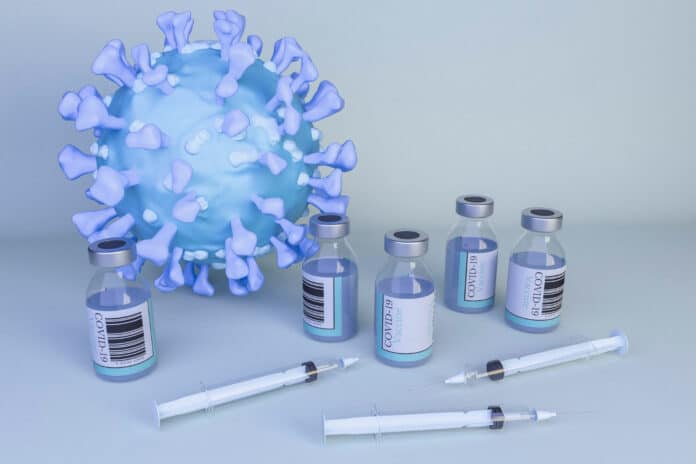The global SARS-CoV-2 pandemic caused significant social and economic disruption worldwide, despite highly effective vaccines being developed at an unprecedented speed. Although effective, these vaccines all rely on the same single antigen and are designed to elicit the production of neutralizing antibodies against this target from the original SARS-CoV-2 strain.
According to Penn State, researchers partnered with Evaxion Biotech, a T-cell vaccine for COVID-19 that may offer broad coverage. Focusing on the T-cell instead, their study is the first to discover the effectiveness of an AI-generated vaccine in a live viral challenge model.
Such a vaccine may provide long-lasting immunity against future emerging variants and could be used as a model for other seasonal viral diseases like the flu, suggest scientists.
In their study, the scientists exposed mice to a deadly dose of SARS-CoV-2 and discovered that 87.5% of the mice who had received the T-cell-based vaccine survived, compared to only 10% of the mice in the control group. In addition, within 14 days of the challenge, all the vaccine-treated mice that survived recovered from the infection.
Girish Kirimanjeswara, associate professor of veterinary and biomedical sciences at Penn State, said, “To our knowledge, this study is the first to show in vivo [in a living organism] protection against severe COVID-19 by an AI-designed T-cell vaccine. Our vaccine was extremely effective at preventing severe COVID-19 in mice, and it can be easily scaled up to start testing it in humans, as well. This research also paves the way for the potential rapid design of novel T-cell vaccines against emerging and seasonal viral diseases, like influenza.”
According to Kirimanjeswara, the spike protein of the SARS-CoV-2 virus is under heavy selection pressure, which can result in mutations that drive the emergence of new variants.
“This means that vaccine manufacturers will have to keep creating new vaccines that target new variants, and people have to keep getting these new vaccines.”
The scientists at Evaxion Biotech created a vaccine with 17 immune system-recognizable epitopes from several SARS-CoV-2 proteins rather than focusing on the spike protein, which is prone to mutation. These epitopes trigger an immunological response from various T cells, guaranteeing a continued defense against new variations.
Kirimanjeswara said, “The virus would have to undergo too many mutations to escape this T-cell-mediated immunity, so that is one advantage. The second advantage is that T-cell-mediated immunity is usually long-lasting, so you don’t need repeated booster doses.”
Why were the first-generation COVID-19 vaccines created to elicit responses from antibodies if T cells are so good at memorizing foreign substances?
Kirimanjeswara said, “It’s harder and takes longer to produce a T-cell-based vaccine than an antibody-based one. Given the urgency with which we needed a vaccine to address the COVID-19 pandemic, it makes sense that vaccine manufacturers created an antibody-based vaccine. Now that the urgency has passed, a second-generation T-cell-based vaccine could be more effective and last longer.”
According to co-author Anders Bundgaard Sørensen, project director Evaxion Biotech, other biotechnology companies are developing T-cell-based vaccines. Still, this team’s vaccine uses multiple types of artificial intelligence in a platform called RAVEN (Rapidly Adaptive Viral rEspoNse) to predict ideal targets for vaccines.
“RAVEN is adaptable,” Sørensen said. “We don’t have to wait for a new strain of a virus to arrive to develop a vaccine. Instead, we can predict what will be needed in advance. That’s not something that others are doing right now.”
Sørensen noted, “It’s much easier to get broad coverage with a T-cell vaccine, as we can include multiple epitopes targeting different proteins.”
He added that, in addition to producing better COVID-19 vaccines, the RAVEN platform could be used to develop better influenza vaccines.
“Often, the designed influenza vaccines work only 30-40% of the time, so a lot of people end up getting sick,” he said. “As the world becomes increasingly integrated, that problem will become larger and larger. Our platform uses AI to predict better what will be needed.”
Sørensen noted that Evaxion benefited from partnering with Kirimanjeswara and his Penn State colleagues because of their deep expertise in animal models of infectious disease and because the University houses a BSL-3 laboratory in which they could safely study the SARS-CoV-2 virus.
He said, “Our results are a testament to the power of industry-university partnerships.”
Journal Reference:
- Gry Persson, Katherine H. Restori et al. DNA immunization with in silico predicted T-cell epitopes protects against lethal SARS-CoV-2 infection in K18-hACE2 mice. Frontiers in Immunology. DOI: 10.3389/fimmu.2023.1166546
